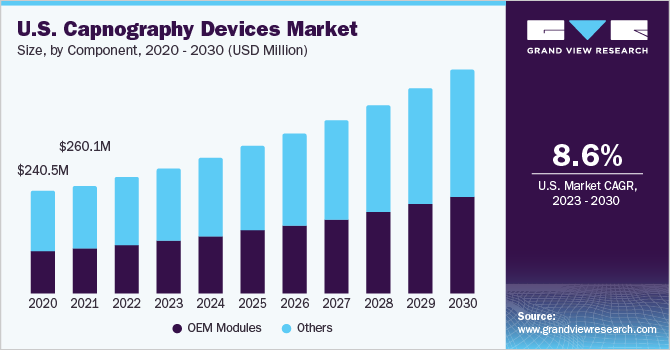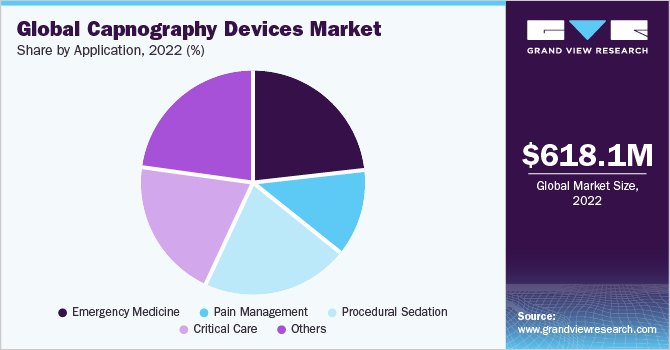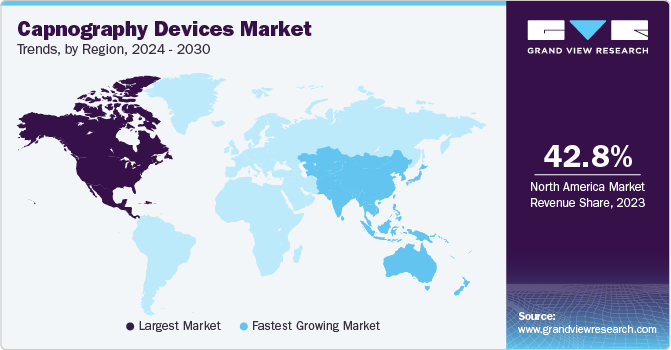- Home
- »
- Medical Devices
- »
-
Capnography Devices Market Size & Share Report, 2030GVR Report cover
![Capnography Devices Market Size, Share & Trends Report]()
Capnography Devices Market Size, Share & Trends Analysis Report By Product (Stand-alone, Handheld), By Technology (Mainstream, Sidestream), By Application, By End Use, By Component, And Segment Forecasts, 2023 - 2030
- Report ID: 978-1-68038-985-2
- Number of Pages: 150
- Format: Electronic (PDF)
- Historical Range: 2018 - 2021
- Industry: Healthcare
Report Overview
The global capnography devices market size was valued at USD 618.1 million in 2022 and is expected to witness a CAGR of 9.9% during the forecast period. Technological advancements, the prevalence of respiratory diseases, and supportive government initiatives are anticipated to boost the market growth over the forecast period. The growing adoption of capnography in the treatment of respiratory diseases, due to higher reliability and efficiency, is expected to improve the medical efficiency of these devices in patient monitoring. According to a 2020 report by the Office of Disease Prevention and Health Promotion, more than 25 million people in the U.S. are suffering from asthma. During the COVID-19 pandemic, market players, such as Medtronic, experienced a surge in the demand for capnography devices, among other respiratory system-related products.

This was mostly because capnography devices fall under the category of non-invasive remote monitoring devices and can be used to support patient monitoring during the treatment of COVID-19, as per the guidelines of the U.S. FDA. This positively impacted the market growth during the pandemic. Emergency medical service patients are frequently monitored with capnography any time pain medication, oxygen, or sedation is given along with if a patient is outfitted with an artificial airway. Elective surgical cases were annulled as COVID-19 flooded hospitals with infected patients. Thus, anesthesiologists and certified registered nurse anesthetists were transferred to intensive care units.
These experts carried capnography knowledge into these units and implemented the technology to help support improved patient outcomes. The pandemic has enhanced the product sales as the demand for remote respiratory monitoring equipment increased, which, in turn, augmented the market growth. Capnography and pulse oximetry in combination is the monitoring standard of care in the operating room setting, and this combination is becoming more regularly used in several in-patient situations, comprising moderate sedation and patient-controlled analgesia. In addition, capnography has become the standard of care to confirm endotracheal intubation in all hospital settings.
COVID19 CRM devices market impact: 6.12% decline in demand
Pandemic Impact
Post COVID Outlook
The capnography devices market declined by 6.12% from 2019 to 2020, unlike the previous projections, wherein the market was estimated at ~ USD 19.4 Billion in 2020
Relaxed lockdown and resumption of nonelective surgeries would accelerate market growth by over 7.0% in the coming years. FDA also revised its compliance policy regarding AED accessories.
Leading players in the market experienced a decline in revenue due to a slowdown in procedural volumes. Declines were witnessed especially, in CRT-Ds, ICDs, LVADs, and pacemakers, among others.
The revised compliance policy allowed facilities additional time, particularly during the COVID-19 pandemic, for procuring FDA-approved AEDs and manufacturers to file the required PMA for necessary accessories.
Medtronic, Abbott, and Boston Scientific Corporation witnessed a decline of 12.1%,10.73%, and 12.12%, respectively, in their cardiac rhythm & heart failure segment in 2020.
The cost-effective and non-invasive features of capnography devices make it an ideal procedure for respiratory monitoring. The increasing geriatric populace and shift in lifestyle are positively impacting the market. Advancements in technology have paved the way for the innovation of portable, efficient, and automatic capnography devices. Moreover, strategic initiatives by key players have also fueled market growth. For instance, in April 2021, Masimo proclaimed that it has received FDA 510(k) clearance for its Radius PCG, a portable capnograph. The device comes with wireless Bluetooth connectivity. In September 2020, Capsule Technologies received FDA approval for its new connected capnography-monitoring technology. With this, the company enhanced its product portfolio.
Component Insights
Based on components, the market is segmented into OEM modules and others. The other components segment includes sampling lines and filters. The others segment holds a dominant market share of 57.3% in 2022. Other components of capnography devices include sampling lines, sensors & airway adapters, anesthetic breathing circuits, cuvettes, cannula, luer connectors, etc. Sampling line is one of the major components, as accuracy of end-tidal CO2 measurement and quality of waveforms are highly dependent on sampling lines. The OEM modules component segment is expected to register the fastest CAGR from 2022 to 2030.
OEM modules are mainly helpful in noninvasive patient monitoring, which drives their adoption. In addition, OEM modules are directly sold to end users-who seek replacement of certain components in a capnography device-through distributors, which accounts for its sizeable share. Moreover, as opposed to conventional OEM integrations, certain companies outsource or allow third-party developers to create OEM modules under the same brand name, to meet the growing market demand and reduce the overall associated costs. Increasing OEM partnerships has expanded the market, thereby fueling overall growth. This segment is further divided into sources, infrared sources, and others.
Product Insights
Based on product, the market is segmented into hand-held, stand-alone, and multi-parameter. The handheld product segment held the largest share of 60.6% in 2022 as a result of the increasing adoption rate due to the associated benefits of handheld capnography. Some of the benefits include high portability, facilitation of required oxygen saturation levels in operative procedures, high durability, and low associated costs. Moreover, newly developed hand-held devices come with a visual and audible alarm and sidestream technology. Thus, such advantages offered by hand-held devices are likely to promote the preference for these instruments.
Multi-parameter products are expected to grow with the fastest CAGR during the forecast period. This growth is credited to their increasing applications in emergency medicines and procedural sedation. Furthermore, advancements in capnography inclusive of miniaturization of sensors and incorporation of multi-sensors in a single device to enable simultaneous monitoring of multi-gasses have resulted in easy & faster sample collection and long-term deployment. The aforementioned factors are anticipated to propel the demand for multiparameter instruments during the forecast period.
Technology Insights
On the basis of technology, the global market has been segmented into the main stream, side stream, and micro stream technologies. The side stream technology segment held the largest market share of 53.2% in 2022 as a consequence of its wide usage in anesthesia monitoring. This high growth was attributed to the wide usage of the side stream technology in anesthesia monitoring. The side stream technology-enabled devices offer a number of benefits. Some of these benefits include ease of connection and fewer problems in sterilization.
These devices also help in monitoring non-incubated substances with the help of nasal adapters. On the other hand, the micro stream technology segment is expected to register the fastest growth rate over the forecast period on account of the rising penetration of these products as a result of technological advancements in this field. In addition, micro stream technology can be used in intubated as well as non-intubated patients and patients of all age groups.
End-use Insights
Based on end-use the market is classified into hospitals, ambulatory care, and others. The hospital segment held the largest share of 58.1% in 2022. The hospitals segment accounted for the largest revenue share of more than 58% of the global market in 2021. The product is used as a preventive measure to tackle critical events in ICUs. The adoption of capnography procedures is high in hospital settings on account of their ease of usage, minimally invasive nature, and enhanced capabilities for calculating patient ventilators measurement. The industry is expected to register an upward growth during the forecast period.
This is mainly on account of the rising incidences of cardiac arrest, which, in turn,is projected to create the need for effective patient monitoring. Moreover, organizations, such as the American Society of Anesthesiologists and the Uruguayan Society of Anesthesiologists, recommended capnography monitoring during anesthetics & procedural sedation. These guidelines support the importance of capnography devices in-hospital use. In addition, the high influence of the U.S. healthcare system on the global healthcare industry has further augmented the segment growth.
Application Insights
The emergency medicine application segment accounted for the maximum revenue share of more than 23% of the global market in 2021. Applications for capnography devices include emergency medicine, pain management, procedural sedation, critical care, and others. Capnographs are widely used in emergency medicine to optimize prehospital ventilation & handle pediatric emergencies, in ambulatory care centers, and as a prognostic indicator for pulmonary blood flow. Moreover, evolving guidelines and recommendations to include capnography in emergency medicine by the American Heart Association (AHA) and the European Resuscitation Council to improve patients’ odds of survival are fueling the demand for capnographs in this segment.

This device has wide applications in the treatment of procedural sedation in dentistry and is thereby expected to grow at a significant CAGR over the forecast period. It offers non-invasive, real-time, and continuous measurement, etc. by producing capnographs, which helps in assessing the present status of a patient’s circulatory and metabolic systems. These associated benefits are expected to increase the adoption of these devices, thereby providing growth to the overall market in the near future.
Regional Insights
In 2022, North America held the largest revenue share of 42.8%. The rising prevalence of respiratory diseases as a consequence of unhealthy lifestyles and high-stress levels is the high impact rendering driver for the regional market. In addition, the incorporation of new reimbursement models for respiratory and monitoring solution procedures in this region and the stringent regulatory guidelines that are aimed at the safety of patients, medical efficacy, and clinical efficiency are expected to drive the product demand in the years to come.

On the basis of geographies, the global market has been segmented into North America, Asia Pacific, Latin America, Europe, and Middle East & Africa. The market in the Asia Pacific region is anticipated to grow at the second-fastest CAGR over the forecast period. The high growth is on account of the constant improvements in healthcare systems, a rise in healthcare expenditure, and growing awareness levels among end users in the region about the adoption of capnography technology.
Key Companies & Market Share Insights
Vendors are investing in product launches, geographical expansions, collaborative agreements, and acquisitions to sustain themselves in the market. The market is expected to become highly competitive as many startups are seeking opportunities in this sector. Furthermore, introducing advanced technologies is expected to drive market growth in the coming years. For instance, in September 2022, Medtronic unveiled its plan to launch the RespArray patient monitor, incorporating Microstream capnography and Nellcor pulse oximetry. This cutting-edge monitoring solution utilizes intelligent algorithms to detect respiratory issues early on and alleviate alarm fatigue. Medtronic intends to release the product in late Q4 2022 and a comprehensive market launch in early 2023.
-
Masimo
-
Smiths Medical (acquired by ICU Medical Inc.)Dragerwerk AG & Co. KGaA
-
Welch Allyn (Hill-Rom Holdings, Inc.)
-
Koninklijke Philips N.V.
-
Medtronic
-
Nonin Medical, Inc.
-
Nihon Kohden Corp.
-
BD
-
Diamedica Ltd.
-
Edan Instruments, Inc.
-
ZOLL Medical
-
Edan Instruments Inc.
-
GE Healthcare
-
Hamilton Medical
-
Mindray Medical
-
Schiller
-
Avante
-
Bionics
-
BPL Medical Technologies
-
Burtons Medical Equipment Ltd.
-
Criticare Technologies Inc.
Capnography Devices Market Report Scope
Report Attribute
Details
Market size value in 2023
USD 676.6 Million
Revenue forecast in 2030
USD 1,312.4 Million
Growth Rate
CAGR of 9.9% from 2022 to 2030
Base year for estimation
2022
Actual estimates/Historical data
2018 - 2021
Forecast period
2023 - 2030
Quantitative units
Revenue in USD Million & CAGR from 2022 to 2030
Report coverage
Revenue forecast, company share, competitive landscape, growth factors and trends
Segments covered
Component, Technology, Application, Product, End Use
Regional Scope
North America, Europe, Asia Pacific, Latin America, Middle East & Africa
Country Scope
U.S., Canada, U.K., Germany, France, Italy, Spain, Denmark, Sweden, Norway, Russia, China, India, New Zealand, Singapore, Japan, Australia, Thailand, South Korea, Brazil, Mexico, Argentina, South Africa, Saudi Arabia, UAE, Kuwait
Key companies profiled
Masimo, Smiths Medical (acquired by ICU Medical Inc.), Dragerwerk AG & Co. KGaA, Welch Allyn (Hill-Rom Holdings, Inc.), Koninklijke Philips N.V., Medtronic, Nonin Medical, Inc., Nihon Kohden Corporation, BD, Diamedica (UK) Limited, Edan Instruments, Inc.
Customization scope
Free report customization (equivalent up to 8 analysts’ working days) with purchase. Addition or alteration to country, regional & segment scope.
Pricing and purchase options
Avail customized purchase options to meet your exact research needs. Explore purchase options
Global Capnography Devices Market Report Segmentation
This report forecasts revenue growth at global, regional & country levels and provides an analysis of the industry trends in each of the sub-segments from 2018 to 2030. For the purpose of this study, Grand View Research has segmented the global capnography devices market report on the basis of component, product, technology, application, end-use, and region:
-
Component Outlook (Revenue, USD Million, 2018 - 2030)
-
OEM Modules
-
Infrared Sources
-
Others
-
-
Others
-
- Product Outlook (Revenue, USD Million, 2018 - 2030)
-
Hand-held
-
Stand-alone
-
Multi-parameter
-
-
Technology Outlook (Revenue, USD Million, 2018 - 2030)
-
Mainstream
-
Sidestream
-
Microstream
-
-
Application Outlook (Revenue, USD Million, 2018 - 2030)
-
Emergency Medicine
-
Pain Management
-
Procedural Sedation
-
Critical Care
-
Others
-
-
End-use Outlook (Revenue, USD Million, 2018 - 2030)
-
Hospitals
-
Ambulatory Care
-
Others
-
-
Regional Outlook (Revenue, USD Million, 2018 - 2030)
-
North America
-
U.S.
-
Canada
-
-
Europe
-
U.K.
-
Germany
-
France
-
Italy
-
Spain
-
Denmark
-
Sweden
-
Norway
-
Russia
-
-
Asia Pacific
-
China
-
India
-
New Zealand
-
Singapore
-
Japan
-
Australia
-
Thailand
-
South Korea
-
-
Latin America
-
Brazil
-
Mexico
-
Argentina
-
-
Middle East & Africa
-
South Africa
-
Saudi Arabia
-
UAE
- Kuwait
-
-
Frequently Asked Questions About This Report
b. The global capnography devices market size was estimated at USD 618.1 million in 2022 and is expected to reach USD 676.6 million in 2023.
b. The global capnography devices market is expected to grow at a compound annual growth rate of 9.9% from 2023 to 2030 to reach USD 1,312.4 million by 2030.
b. North America dominated the capnography devices market with a share of 42.8% in 2022. This is attributable to the rising prevalence of respiratory diseases as a consequence of unhealthy lifestyles and high-stress levels.
b. Some key players operating in the capnography devices market include Masimo, Smiths Medical (acquired by ICU Medical Inc.), Dragerwerk AG & Co. KGaA, Welch Allyn (Hill-Rom Holdings, Inc.), Koninklijke Philips N.V., Medtronic, Nonin Medical, Inc., Nihon Kohden Corporation, BD, Diamedica (UK) Limited, Edan Instruments, Inc.
b. Key factors that are driving the capnography devices market growth include increasing adoption of capnography in anesthesia administration in target applications, such as monitoring patients undergoing procedural sedation, intubated patients during patient transfer in hospitals, and patient-controlled analgesia.
Share this report with your colleague or friend.
![gvr icn]()
NEED A CUSTOM REPORT?
We can customize every report - free of charge - including purchasing stand-alone sections or country-level reports, as well as offer affordable discounts for start-ups & universities. Contact us now
![Certified Icon]()
We are GDPR and CCPA compliant! Your transaction & personal information is safe and secure. For more details, please read our privacy policy.
We are committed towards customer satisfaction, and quality service.
"The quality of research they have done for us has been excellent."





